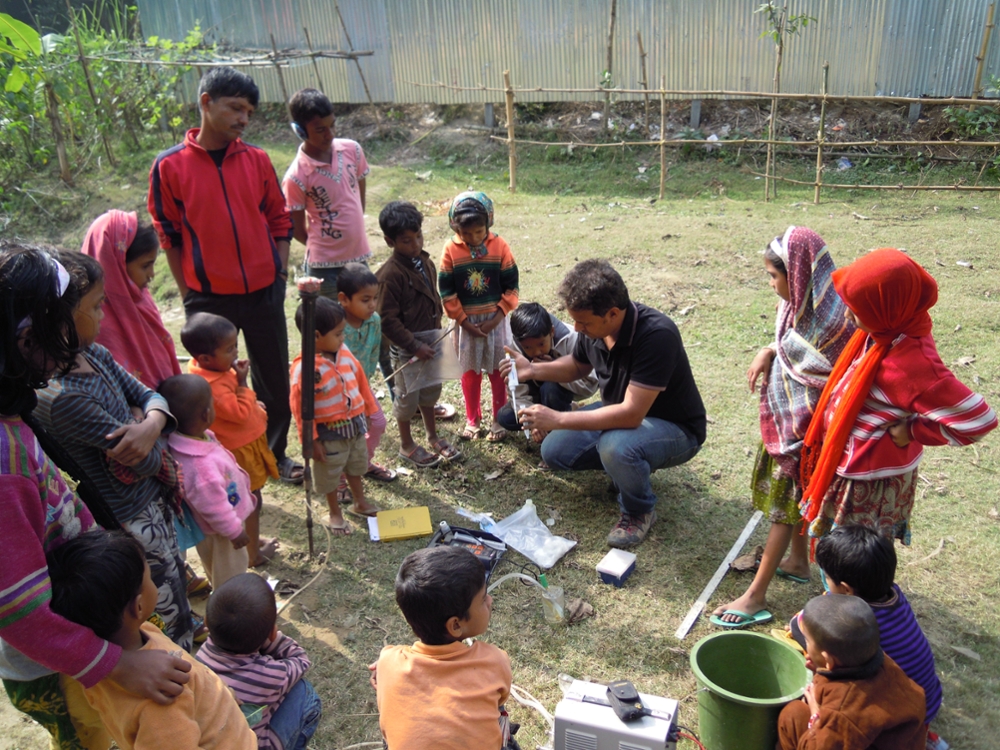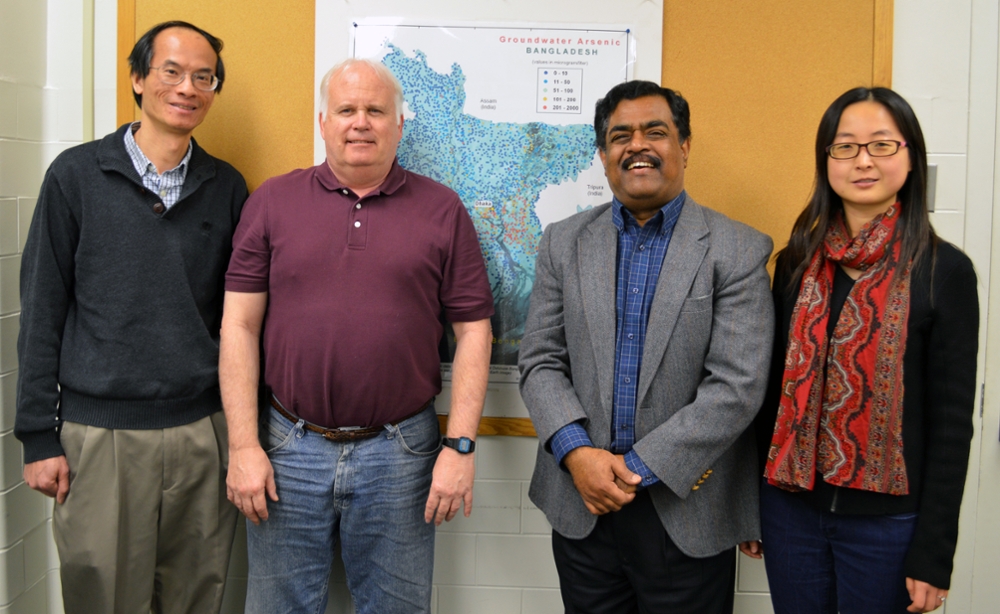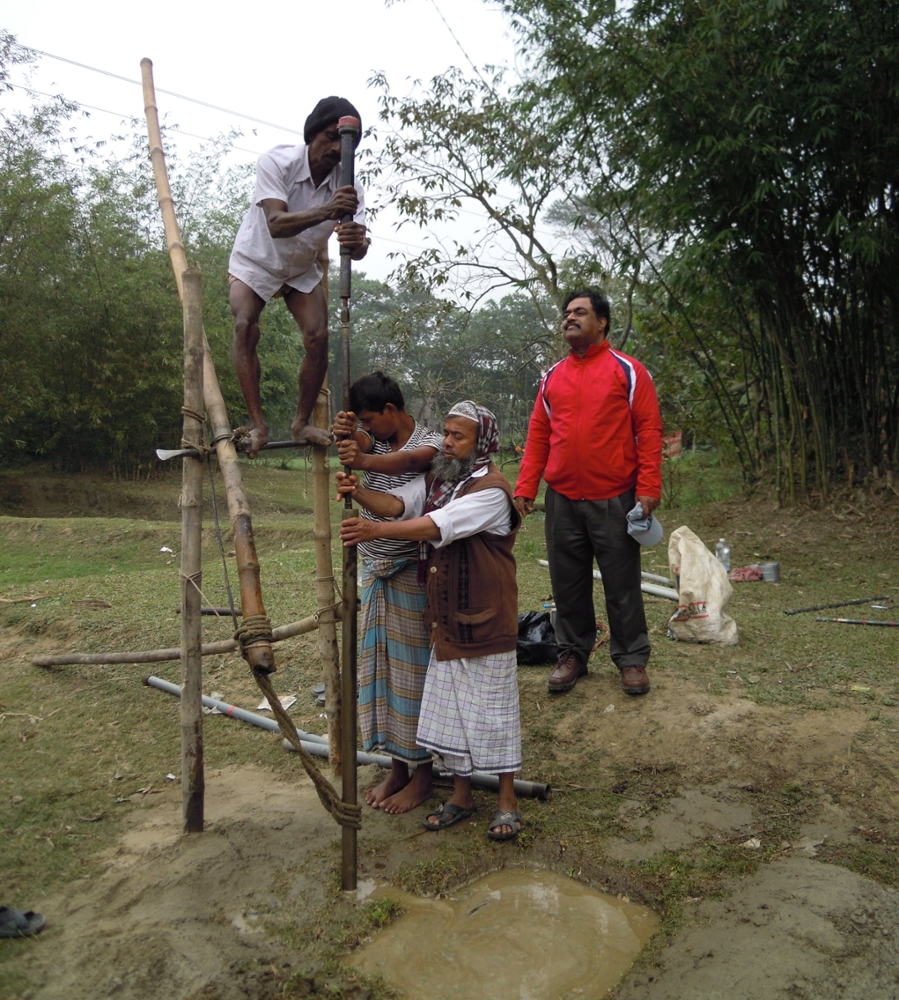COSAM News Articles 2015 February Name change for Department of Geology and Geography reflects broad range of expertise
Name change for Department of Geology and Geography reflects broad range of expertise
AUBURN UNIVERSITY — The Auburn University Board of Trustees voted today to change the name of the Department of Geology and Geography to the “Department of Geosciences.” The change is due to the ever-widening areas of expertise of the department’s faculty and the resulting increase in both interdepartmental and interdisciplinary instruction and research.
Local children watch as geology graduate student Rezaul Huq measures groundwater parameters in Bangladesh.
“Geology and Geography are diverse fields, and the expertise of our faculty spans a broad range of both the natural and social sciences, bridging them perhaps as well as any other unit at Auburn University, which makes us well suited for interdisciplinary research and instruction,” said Mark Steltenpohl, chairman of the Department of Geosciences. “Faculty expertise and research activities contribute to a variety of Auburn’s strategic research areas, particularly in health, the environment, and energy, and we collaborate with faculty in many units across campus, including those in the colleges of Sciences and Mathematics, Agriculture, Engineering, Human Sciences, Liberal Arts and Education, and the schools of Nursing and Forestry and Wildlife.”
One such collaboration includes faculty experts in geology, geography and psychology who are exploring the dynamics involved in interactions between humans and water resources in Bangladesh, in particular the cause and effect between arsenic contamination in the ground water and the population. The primary investigators on the project are Geology Professors Ming-Kuo Lee, James Saunders and Ashraf Uddin, Assistant Professor of Geography Yingru Li, and Alumni Professor in the Department of Psychology Chris Newland.
As one of the fastest growing countries in the world in terms of economic development and population, Bangladesh has experienced tremendous and rapid industrialization, urbanization and globalization, as well as environmental degradation.
The research team, from left, Geology Professor Ming-Kuo Lee, Geology Professor James Saunders, Geology Professor Ashraf Uddin, and Assistant Professor of
Geography Yingru Li.
“Our research examines the socioeconomic development as both a driving factor and a consequence of the interaction between natural and human systems,” said Li. “On one hand, human activities have significant impacts on water quality and water supply. The potential socioeconomic driving factors mainly include land-use and land-cover change, transportation, industrial emissions, municipal sewage, and the extensive use of pesticide and fertilizers for farming. On the other hand, water quality and supply greatly influence socioeconomic development and population health. For example, in Bangladesh, millions of people are exposed to arsenic-contaminated groundwater, which has caused various health effects on local residents, such as increased risk of diabetes, hypertension, cardiovascular diseases and cancers.”
In an effort to address the longstanding concerns in Bangladesh about water resources, land loss, human migration and human health, faculty and students in the Department of Geosciences have a history of researching the groundwater in the country, with a particular focus on arsenic contamination.
Professor Ashraf Uddin is in Bangladesh watching the installation of a hand-driven, very shallow well where the team collected sediment and water samples from shallow aquifers.
“Our current initiative is indicative of the types of work our department is consistently producing and utilizes the power of interdisciplinary research to address scientific problems and associated socioeconomic issues via surveying and modeling,” said Uddin. “An improved understanding of the links between seasonal drought and monsoonal flooding from the large rivers, arsenic release into the groundwater, water clogging in densely populated areas, human health, and population migration will benefit the people of Bangladesh but also holds potential for application to similar drainage basins worldwide.”
An increase in interdisciplinary research efforts among faculty also has positive benefit for Auburn University students.
“The work will include research and educational activities for undergraduate and graduate students from the U.S., Bangladesh and India. The research will expose students to field, laboratory and modeling research on a major human crisis in the global arena,” said Lee. “The results will be of great interest to the broad fields of geology, geochemistry, hydrology, environmental health, human behavior, climate change, sustainability and geospatial and geostatistical analysis. The links between arsenic contamination, water salinization, human behavior and health, and human adaptation to reduce arsenic exposure, are potentially transformative to many watersheds impacted by similar environmental processes and human systems.”
Latest Headlines
-
07/09/2024
-
Summer Bridge Program celebrates 21 incoming Auburn students as they prepare for future STEM careers07/02/2024
-
07/02/2024
-
06/17/2024
-
06/07/2024




